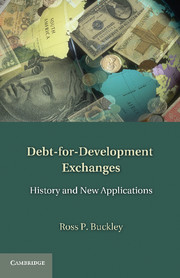Book contents
- Frontmatter
- Contents
- Acknowledgments
- List of Contributors
- Introduction: A Productive Partnership between Civil Society and the Academy
- Part I Types of Exchanges and Their Development over Time
- Part II Exchanges by Donor Countries
- Part III Critiques of Exchanges
- Part IV Innovative Applications of Exchanges
- 15 Farmer-Managed Natural Regeneration: A Land Rehabilitation Technique Well Adapted to Funding by Exchanges
- 16 Restoring Mangroves in the Philippines
- 17 Poverty Reduction through Social Protection: A Potential Form of Debt-for-Development Exchange
- 18 Climate Change Adaptation Exchanges: An Exploration of the Possibilities and Risks
- 19 Climate Change and Food Security: Building Resilience by Means of Climate Field Schools
- 20 Debt-for-Security Exchanges
- 21 Promoting Good Governance through ICT Systems: Improving Transparency and Reducing Corruption
- 22 Using Debt Exchanges to Enhance Public Accountability to Citizens
- Conclusion
- Index
- References
21 - Promoting Good Governance through ICT Systems: Improving Transparency and Reducing Corruption
Published online by Cambridge University Press: 01 June 2011
- Frontmatter
- Contents
- Acknowledgments
- List of Contributors
- Introduction: A Productive Partnership between Civil Society and the Academy
- Part I Types of Exchanges and Their Development over Time
- Part II Exchanges by Donor Countries
- Part III Critiques of Exchanges
- Part IV Innovative Applications of Exchanges
- 15 Farmer-Managed Natural Regeneration: A Land Rehabilitation Technique Well Adapted to Funding by Exchanges
- 16 Restoring Mangroves in the Philippines
- 17 Poverty Reduction through Social Protection: A Potential Form of Debt-for-Development Exchange
- 18 Climate Change Adaptation Exchanges: An Exploration of the Possibilities and Risks
- 19 Climate Change and Food Security: Building Resilience by Means of Climate Field Schools
- 20 Debt-for-Security Exchanges
- 21 Promoting Good Governance through ICT Systems: Improving Transparency and Reducing Corruption
- 22 Using Debt Exchanges to Enhance Public Accountability to Citizens
- Conclusion
- Index
- References
Summary
INTRODUCTION
This chapter proposes that investment in information and communication technology (ICT) systems through a debt-for-development exchange can be used to promote good governance, and in turn development, in developing countries. It proceeds on the basis that deficient (or poor or bad) governance in developing countries is a principal cause of their underdeveloped conditions.
Many heavily indebted developing countries are resource rich. The seeming paradox of poverty and debt amidst heavy resource endowments has been the subject of much study and writing. Some have called the situation the ‘resource curse’, suggesting a correlation between resource endowments and poverty and underdevelopment. Others disagree, as does this author. Arguably, it is the quality of governance that determines whether the availability of natural resources (and related revenues) will be positive or negative for a nation. Strong political will and institutions underpinning sound governance can ensure that the economies of resource-rich countries are efficiently and effectively managed for the betterment of those countries and their peoples. That is what distinguishes resource-rich developed countries (such as Australia, Canada, Norway and the United States) from the many resource-rich but poor developing countries. The poverty and indebtedness are due to factors other than the presence (or even lack) of natural resources.
Some of the factors that have been proffered to explain the underdevelopment of resource-endowed economies include human geography, culture, colonialism and conspiracy of world powers and deficient governance (or poor or bad governance).
Information
- Type
- Chapter
- Information
- Debt-for-Development ExchangesHistory and New Applications, pp. 260 - 295Publisher: Cambridge University PressPrint publication year: 2011
References
Accessibility standard: Unknown
Why this information is here
This section outlines the accessibility features of this content - including support for screen readers, full keyboard navigation and high-contrast display options. This may not be relevant for you.Accessibility Information
- 1
- Cited by
